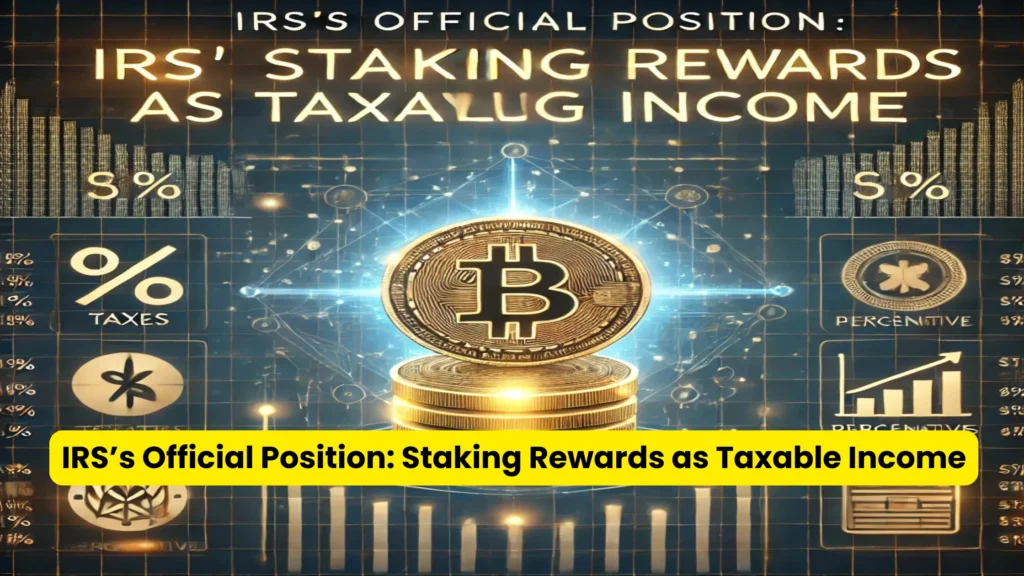
Table of Contents
The United States Internal Revenue Service (IRS) has come down hard on cryptocurrency staking rewards, stating that tokens received through staking are treated as income, and are therefore taxable when received. This declaration comes as cryptocurrency investor Joshua Jarrett and the IRS continue an ongoing legal battle over the IRS’s interpretation. The implications of this case could be far-reaching for all related to the cryptocurrency industry.
IRS’s Official Position: Staking Rewards as Taxable Income
The IRS has also filed a December 20, 2024 court filing that references Revenue Ruling 2023-14, which sets out the IRS’s position on staking rewards. Under this ruling, tokens issued to a taxpayer in exchange for staking, whether on a proof-of-stake blockchain or a similar protocol, must be considered part of a taxpayer’s gross income for the year they are received.
For the IRS, the quid pro quo is “dominion and control.” Staking rewards credited to a taxpayer’s account are deposited immediately into that account and are immediately available for use, transfer, or sale. With this, the IRS treats these tokens as being taxable income when they’re received at fair market value. The concept is line with the wider principle of taxation of income in cases where the taxpayer has the ability to control and accrue that income.
According to the IRS, this treatment is in line with tax principles. Nonetheless, this position has resulted in widespread debate among the crypto community, as many stakeholders have been advocating for an unfair burden being placed on the investors.
The Jarrett Legal Challenge: A Fight for Fair Tax Treatment
Joshua Jarrett and his wife registered Jessica have challenged the position of the IRS by filing a lawsuit in October 2024. The couple also says tokens created through staking should not be considered income as soon as they are received. They contend, however, that such tokens are like newly minted property, like a crop grown by a farmer or a product manufactured, that are taxed only when sold.
According to its argument, the IRS’s approach requires taxpayers to pay taxes on assets that might not be fungible quickly. Whenever crypto tokens are received, they often experience extreme price volatility due to crowdsourced fundraising, so the tokens may become taxed upon receipt, which could create tax liabilities that exceed the value of what is sold.
This isn’t the first time the Jarretts’ve gone up against the IRS. ‘In another case, in 2015, the IRS withdrew the refund request after promising to refund taxes paid on staking rewards, but the Jarretts insisted on a definitive court ruling.’
IRS’s Official Position: What Is Crypto Staking?
One type of crypto staking involves locking up some amount of a specific token to participate in the validation of transactions on proof of stake blockchains. It also serves the purpose of securing the network and validating new blocks of transactions. In return for this, participants—known as stakes—receive extra tokens as rewards.
Proof of stake blockchains like Ethereum, Cardano and Solana became popular as they became important domain names in the crypto world. As an investment mechanism, it allows investors to generate passive income and help secure and function crypt volatile blockchain networks simultaneously.
Implications for Crypto Investors
The IRS’s stance on crypto staking rewards has split crypto investors and tax professionals.
- Criticism of the IRS Approach
Critics say taxing staking rewards when received is a big burden for investors as the value of crypto tokens can see massive swings. A highly valued token received on the day it is received might lose it all once sold resulting in being on an unfair tax.
Additionally, such an approach may be too expensive for participants to be deterred from staking in proof of stake networks, which is essential for the usability and security of proof of stake networks.
- Taxation at Receipt Support
Those in favour of the IRS position point to a single tax platform as the key. That’s because they believe that taxing staking rewards at receipt is a way to make things transparent and compliant so that the people involved in the sector are disciplined and not under the spotlight commonly criticized for lack of regulation in this emerging type of business.
The Regulatory Scrutiny of the Crypto Industry
It’s part of a broader attempt to crack down on the cryptocurrency industry. Over the past few years, the agency has instituted rules making sure that taxpayers declare their cryptocurrency holdings and transactions.
Last year, the IRS asked taxpayers to answer certain questions about their cryptocurrency activity on their annual tax returns. It showed the agency’s intent to crack down on the underreporting of crypto income.
The efforts do not stop at the United States. Governments around the world are creating rules and regulations for Cryptocurrency taxation and compliance globally. By adapting traditional tax principles to meet the features of digital assets, the world has demonstrated the need to evolve the regulatory landscape.
A Pivotal Moment for Crypto Taxation
The time has come for the cryptocurrency industry to fully understand that the IRS deems cryptocurrency staking rewards to be taxable upon receipt. The agency’s position, which sets out to provide clarity and consistency in crypto taxation, is in contrast to the fact that there is an ongoing legal challenge that reflects the difficulties inherent in applying ‘traditional tax’ principles to digital assets.
The case will be watched closely by investors, tax professionals and policymakers as it proceeds and its outcome will be closely watched. For the time being, crypto investors, engaged in staking, are also being advised to inform themselves about changes as they unfold and seek professional advice concerning handling in this period.
Read more article: Should You Buy XRP (Ripple) While It’s Under $3?


